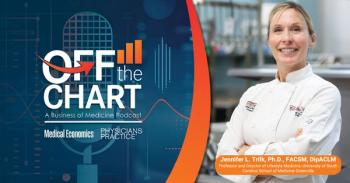
The Inbox: Why Can't Docs and PAs Get Along?
In our recurring blog "Inbox" we share comments from physicians and practice administrators telling us what keeps them awake at night.
Editor's note: We work hard to write about issues that will help physicians run their practices in a manner that is both prosperous and efficient, while still delivering quality patient care. And we are delighted when our readers let us know what they are thinking. This month we are excerpting a blog by certified physician assistant Stephen H. Hanson that was written about the conflict between physicians and PAs over the roles each group should fill. The article has been edited for space and is followed by comments made by readers at PhysiciansPractice.com.
NEEDLESS CONFLICT BETWEEN PHYSICIANS AND PAs
I was recently perusing social media related to physician assistants (PAs), and I came across a blog by a PA on a physician website. This PA was writing about the increasing conflict among physicians, PAs, and nurse practitioners (NPs) in a variety of environments. The PA did what I thought was a good job of explaining his role in team medicine, and recognizing the obvious limitations of his scope of practice and training. He also observed what I too have observed over 35 years of practice: It is pretty hard to distinguish between the work of appropriately educated and experienced providers in the clinical environment.
That is where the conflict began. There was a lot of back and forth between the physicians, the NPs, and PAs on this subject. On the physician side, there was a lot of concern focused on the perceived superior medical training of a physician. There was also angst regarding the "corporatization" of medicine and how the bureaucracy of medicine has reduced physicians and all the providers in the healthcare system to little cogs in a big wheel.
Michael writes: I skimmed the comments and saw more of the same, in-fighting, when the bigger crux of the article, in my view, was the following: "We all need to work together, and respect each other's skills, abilities, education, and experience." The stress of the healthcare system, as noted, is creating intense stress and anger. Managing that effectively, not turning on each other, subjugating ego, and being better "teammates" in serving mankind should be the goal.
Anonymous says: Mr. Hanson, your logic analogies fail. A couple of examples: You bemoan "angst" regarding "little cogs in a big wheel" and then go on to embrace a "team" that has "many moving parts." You force a choice between a generalist physician and a trained PA in the care of a loved one (could have picked any other combination such as farmer or truck driver). No need to be so limited. Given a choice, most would simply choose a well-trained, experienced, affable board certified plastic surgeon. My experience with literally hundreds of PAs is that they seek out a physician for their own care and that of their loved ones.
Stephen Hanson responds: My weak metaphor was about the transition of the role of the physician within the healthcare system in the U.S. over the past five decades, and the transition to the new reality of the team practice of medicine. It is not illogical. Most people choose care from the physician, PA, or NP with whom they feel comfortable, regardless of their title. Your statement of experience with "hundreds of PAs" may be anecdotal, but has no basis in fact. As a past president of the American Academy of Physician Assistants, I know literally thousands of PAs. Patients prefer to see people who are willing to help them in a timely manner, and have the training and experience to make a difference in their lives. Many studies have shown a very high level of satisfaction with the care received from a PA, and a willingness to see a PA or NP for care.
In a perfect world, there would be a board certified plastic and reconstructive surgeons just waiting in the emergency department for you or your loved one to arrive with their dog bite, severe facial laceration, hand injury, or facial fracture. You and I both know that this is not how the real world works. A surgical PA like me provides dramatically improved access to expert specialty care, and makes my surgeon partner more effective, and his care more available. We complement each other…
Mark comments: It is important to remember why PAs and APRNs are referred to as "physician extenders." The original idea was that extenders might work like residents in a private practice setting, running cases by doctors, who still heard about each patient and approved each plan in advance. And if a patient was seen by an extender on one visit, then they would definitely be seen BY THE DOCTOR at the next visit. Alas, doctors got lazy. That is why we couldn't manage our own practices and were overtaken by healthcare conglomerates. Doctors got greedy. Why pay for another doctor when you can oversee an extender (that you never actually oversee)? And finally, the system got greedy, and decided that we could have such things as nurse practitioner clinics, where only nurse practitioners see patients and some doctor (who lives within 30 miles) signs off on charts for some [amount of] compensation per year.
So now, we have clinics that don't have doctors at all. We have flow sheets to teach everybody cookie-cutter medicine. Everybody thinks they can do it, as well as or better than the doctor. No. You cannot. If you were as smart as the doctor, you would have gotten into medical school. People would be stunned to know the difference in training - because I assure you, they do not know. I don't blame extenders for how things have fallen into their current state, but just as a primary-care physician or a specialist must know the limits of their abilities, extenders must know the limits of their abilities too. Extenders need supervision. Doctors need to provide it.
Anne says: "If you were as smart as the doctor, you would have gotten into medical school." … You obviously have no knowledge about admissions in either profession, as almost no PA wants to be a doctor or has ever applied to medical school. If they/we wanted to be physicians, they/we could have easily done so (did you know it's easier to get into medical school (43 percent of applicants accepted) than it is to PA school (30 percent of applicants accepted?). Today's PA students, at least those matriculating in well-established programs, have applications that are virtually indistinguishable from medical-school applicants, with the exception of having actual healthcare experience (a good thing!).
As a long-time medical faculty member at a prominent research institution, I teach and precept both MD and PA students and compare their performance side by side, both in the classroom and in clinic. Their backgrounds and qualifications are identical, and their clinical abilities indistinguishable (actually, the PA students tend to perform better). The difference I see for most of them, at least at my institution, is that the medical students are more likely to be driven by social status, money, or parental push into medicine, while the PA students are more likely to be driven by social justice, patient-care, and self-care/lifestyle…
Teresa writes: Whole hearted agreement here! The confusion is widespread because understanding is complicated. Physicians oppose (NP) full practice authority when they don't understand what the NP scope of practice means or what is included. They don't understand because they see that PAs and NPs perform similar functions. The PA and NP have very different licensing rules which vary widely by state. The healthcare facilities (and credentialing bodies) get this wrong too, because they are run by administrators who are unfamiliar with the licensing rules.
Aleesa comments:
It has been how many years now and the complaints and comparisons continue. I am an NP. I have a PhD. I worked with physicians in collaborative practice(s) since 1997. I have worked with medical residents and been a preceptor to both APN and PA students. I agree that physicians are exceptionally well-trained. Yet, like NPs and PAs each of them do not graduate at the head of the class. NPs have their own professional discipline and cannot be compared to physicians. What we offer is different, yet similar, as well as complementary. NPs make good teammates as nurses have since the Crimean War.
… My own experience would probably make the case for me to develop an initial plan of care over a physician with one to two years of independent practice. I have had patients refuse to have their care transferred to a physician, resulting not in poor outcomes, but rather improved patient education, and collaborative efforts.
That being said, I agree, that physicians should initiate the plan of care. After all, the profession of medicine is focused on disease and illness. Despite the 85 percent reimbursement ruling by Medicare (that the AMA fiercely lobbied to have), research has proven that the plan of care developed and rendered by the NP is as efficacious in promoting positive outcomes for the patient. The nursing profession is more focused on discharge planning and returning patients back to a state of health and wellness…
Alancia writes: That is a false argument. While your years of experience do give you more knowledge in your scope of practice than a physician of any specialty who does not do that work, those initial evaluations should still be done by a physician. When I refer my patient to a specialist I expect them to be evaluated by a specialist physician. Once they are stable if they see a PA intermittently that is fine.
Douglas says: Wow. What a bunch of BS. I spend a lot of time reviewing notes and orders from PAs and NPs and their level of clinical acumen and understanding of disease process and injury care is akin to a 3rd-year medical student. I will agree that the issue is not the PA/NP it is their employers who allow them to evaluate patients for initial visits with ill-defined symptoms or injuries that truly should be seeing a physician. The role of the PA/NP is to follow stable, chronic disease, and limited scope of practice. They are not a "mini-me."
What is your policy on scope of practice for PAs and NPs? Tell us what you think; join the conversation at
Newsletter
Optimize your practice with the Physicians Practice newsletter, offering management pearls, leadership tips, and business strategies tailored for practice administrators and physicians of any specialty.








